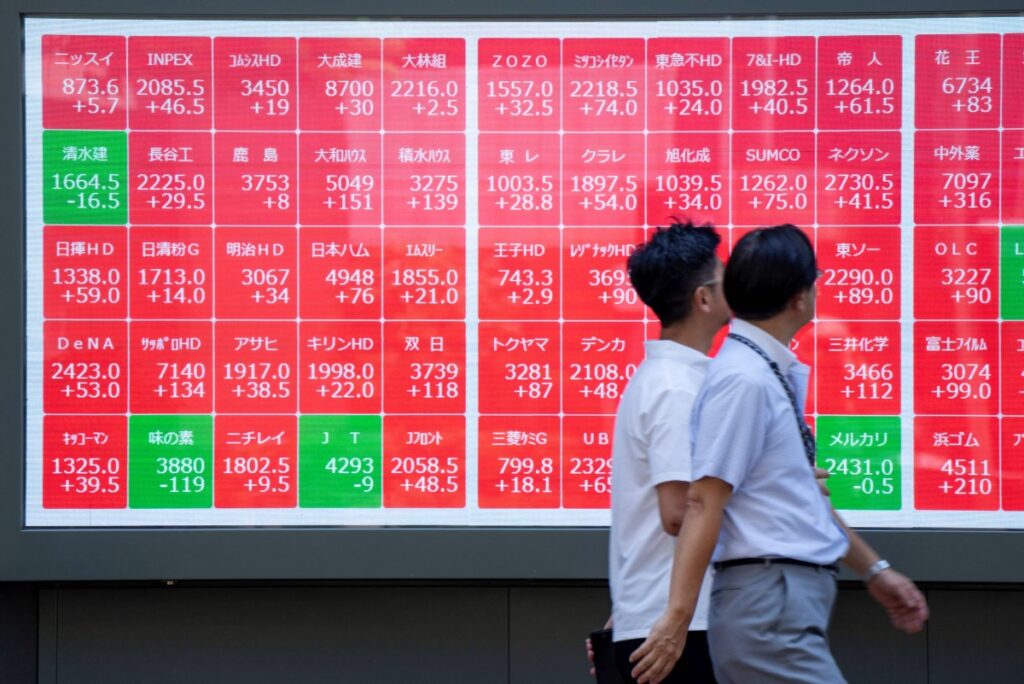
Japan's Nikkei 225 and Topix Indices Both Surge to Record Highs as Fast Retailing Leads Five-Day Rally
Japan's Market Renaissance: Nikkei Soars to Unprecedented Heights as Structural Reform Bears Fruit
TOKYO — Japan's benchmark Nikkei 225 stock index has surged to unprecedented heights, currently trading at 43,775.12 after gaining 2.64% over the past five trading days—a remarkable advance of 1,127.39 points that represents the highest level in the index's history. The Nikkei 225, which tracks 225 major Japanese companies weighted by share price, has now climbed more than 16% over the past twelve months, reflecting sustained investor confidence in Japanese equities and marking a dramatic acceleration in recent sessions.

Simultaneously, the broader Topix index—which measures all companies listed on the Tokyo Stock Exchange's Prime Market and provides a more comprehensive view of Japanese market performance—has written its own chapter in this historic surge, currently trading at 3,127.81 after gaining 2.24% over the past five days, an advance of 68.59 points that likewise represents an all-time high. This parallel ascent across both indices underscores the breadth of investor enthusiasm sweeping through Japanese markets, signaling something more profound than cyclical momentum.
The Nikkei 225 index's historical performance, showing its recent surge past the 1989 bubble-era peak.
| Date | Event | Closing Level (JPY) |
|---|---|---|
| December 29, 1989 | Bubble-era peak | 38,915.87 |
| March 2009 | Post-bubble low | 7,054.98 |
| February 22, 2024 | Surpassed 1989 peak | 39,098.68 |
| August 12, 2025 | New all-time high closing | 42,718.17 |
| August 13, 2025 | Breached 43,000 for the first time | 43,274.67 |
The recent five-day surge has been particularly driven by Fast Retailing Co., the parent company of the global Uniqlo clothing chain, whose shares have provided substantial momentum to the price-weighted index. Fast Retailing's influence stems from its significant weighting in the Nikkei calculation, where higher-priced stocks carry disproportionate impact regardless of company size—a structural characteristic that amplifies individual stock movements across the broader index.
However, the session also revealed selective investor preferences, as prominent technology companies posted declines. SoftBank Group Corp. and Sony Group Corp. each fell 0.42%, demonstrating that Monday's market advance was concentrated in specific sectors rather than representing broad-based enthusiasm across all industries.
Market analysts attributed the record-setting performance to three primary factors: the spillover effect from strong U.S. market performance the previous week, particularly the Dow Jones Industrial Average's own record highs; supportive corporate earnings reports from Japanese companies; and the continued impact of a weaker Japanese yen, which has enhanced the competitiveness of Japanese exporters and manufacturers in global markets.
The Currency Catalyst: When Weakness Becomes Strength
Behind the headline numbers lies a more nuanced story of currency dynamics reshaping Japan's competitive landscape. The yen's measured decline to the 147-148 range against the dollar has created a golden opportunity for Japanese exporters and manufacturers, transforming what many observers once viewed as a structural weakness into a strategic advantage.
The Japanese Yen's exchange rate against the U.S. Dollar over the past several years, illustrating the trend of a weaker yen.
This currency positioning has proven particularly beneficial for Japan's automotive and industrial sectors, which have leveraged the favorable exchange rate to enhance their global competitiveness. Market participants suggest this trend could accelerate, as the Bank of Japan maintains its cautious approach to monetary normalization with rates currently at 0.5%.

The implications extend beyond immediate earnings impacts. Currency-sensitive sectors are experiencing a renaissance that analysts believe could sustain momentum through the remainder of 2025, provided global economic conditions remain supportive and trade tensions don't resurface dramatically.
The Berkshire Effect: When Warren Buffett's Shadow Reaches Tokyo
Monday's gains cannot be viewed in isolation from broader global dynamics, particularly the reverberations from Warren Buffett's Berkshire Hathaway disclosing a substantial $1.6 billion stake in UnitedHealth Group. This development, which propelled the Dow Jones Industrial Average to its own record high on Friday, created a ripple effect of optimism that reached across the Pacific to Tokyo's trading floors.
The psychological impact of Buffett's endorsement extends beyond the immediate healthcare sector implications. When the Oracle of Omaha signals confidence in quality companies trading at reasonable valuations, global investors take notice. This sentiment boost helped sustain risk appetite in Japanese equities, even as other major U.S. indices retreated amid Federal Reserve policy uncertainty.
Investment professionals observe that such cross-border sentiment transmission has become increasingly important in today's interconnected markets, where capital flows respond as much to narrative as to fundamentals.
Structural Metamorphosis: The Governance Revolution Gains Momentum
Beneath the surface of daily market movements lies a more profound transformation that may prove far more significant than any single day's trading action. Japan's corporate governance revolution, catalyzed by the Tokyo Stock Exchange's cost-of-capital awareness initiatives, is beginning to generate tangible results that sophisticated investors have long anticipated.
Japan's corporate governance reform is a significant push, led by the Tokyo Stock Exchange, to boost corporate value and shareholder returns. The reform pressures companies, especially those with a low price-to-book ratio (PBR), to improve capital efficiency and shift from a traditional stakeholder model towards "shareholder capitalism."
Over 90% of Prime-listed companies have responded to governance reform mandates, implementing measures designed to enhance shareholder value and operational efficiency. This compliance rate represents more than bureaucratic box-checking—it signals a fundamental cultural shift toward Western-style shareholder capitalism that could unlock trillions of yen in previously dormant value.
The evidence appears in corporate buyback announcements, which reached record levels throughout fiscal 2024 and continue at elevated rates into 2025. These programs represent more than financial engineering; they reflect management teams increasingly focused on capital allocation efficiency and shareholder returns.
The Fast Retailing Phenomenon: Retail's Unexpected Leadership
Fast Retailing's outsized influence on Monday's market performance illuminates both opportunity and risk within Japan's price-weighted Nikkei index. The company's approximately 9% weighting means individual stock movements can significantly impact overall index performance, creating concentration risks that professional investors must carefully navigate.
In a price-weighted index, like Japan's Nikkei 225, stocks with a higher share price have a greater impact on the index's value, regardless of the company's actual size. Conversely, in a market-cap-weighted index, such as the Topix, companies with a larger total market capitalization (stock price multiplied by shares) have more influence.
This dynamic has prompted institutional investors to increasingly favor broader market exposure through the Topix index or international equivalents like the MSCI Japan, which offer more balanced sector representation and reduced single-stock concentration risk. The iShares MSCI Japan ETF, currently trading at $80.15 with substantial volume of 5.58 million shares, reflects this institutional preference for diversified Japanese equity exposure.

Market strategists suggest this index concentration dynamic could become more pronounced as Japan's market rally matures, potentially creating tactical opportunities for sophisticated investors willing to exploit price discrepancies between different market segments.
Technology's Mixed Signals: Giants Stumble as Markets Soar
Monday's trading session revealed intriguing divergences within Japan's technology sector, as market darlings SoftBank Group and Sony Group each declined 0.42% despite the broader market's advance. This performance suggests investors are becoming increasingly discriminating about technology valuations, particularly for companies trading at premium multiples.

These declines serve as a reminder that Japan's market rally, while broad-based, is not indiscriminate. Quality and valuation discipline are becoming increasingly important as the market matures and institutional investors deploy more sophisticated analytical frameworks.
Investment Implications: Navigating the New Landscape
For institutional investors seeking exposure to Japan's continuing market evolution, several strategic considerations emerge from current market dynamics. The structural case for Japanese equities remains compelling, supported by genuine corporate reform, favorable demographic shifts in savings patterns through NISA accounts, and renewed focus on shareholder value creation.
Japan's NISA (Nippon Individual Savings Account) is a government-sponsored program designed to encourage citizens to invest by offering tax-advantaged accounts. The initiative aims to stimulate the Japanese stock market by shifting household savings into investments.
However, tactical positioning requires nuanced approach. Currency hedging strategies may prove valuable given potential volatility in USD/JPY relationships, particularly as Bank of Japan policy normalization continues. The current rate environment suggests room for additional monetary tightening, which could impact currency dynamics and sector rotation patterns.
Market analysts propose that investors consider broader index exposure rather than concentration in price-weighted benchmarks, given the concentration risks highlighted by Fast Retailing's index impact. Additionally, the banking sector appears positioned for potential re-rating as interest rate normalization proceeds, offering tactical opportunities for value-oriented investors.
The confluence of structural reform, supportive monetary conditions, and improving corporate governance creates a compelling investment environment that transcends typical cyclical considerations. As Japan's equity markets continue setting new records, the underlying transformation suggests this rally may represent the beginning rather than the culmination of a multi-year revaluation cycle.
Investment decisions should consider individual circumstances and risk tolerance. Past performance does not guarantee future results, and investors should consult qualified financial advisors for personalized guidance.